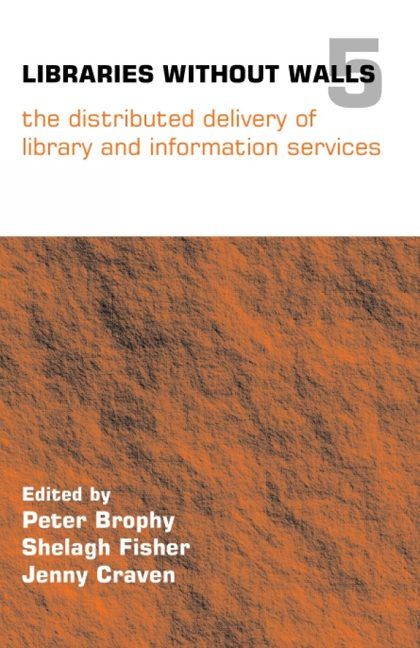Book contents
- Frontmatter
- Contents
- Contributors
- 1 Introduction
- 2 Keynote paper: beyond the mainstream of library services
- THEME 1 THE INTEGRATION OF LIBRARY SERVICES AND VIRTUAL LEARNING ENVIRONMENTS
- 3 Staff without walls: developing library and information staff for e-learning
- 4 Supporting information-based networks in higher education
- 5 Library services and virtual learning: the DEViL project
- 6 Virtual learning and teaching resources: the library as a collaborator
- 7 Virtual learning environments and Greek academic libraries
- THEME 2 THE RELATIONSHIP BETWEEN USER NEEDS, INFORMATION SKILLS AND INFORMATION LITERACIES
- THEME 3 USABILITY AND ACCESSIBILITY OF DIGITAL LIBRARY SERVICES
- THEME 4 DESIGNING THE INFORMATION ENVIRONMENT: NATIONAL AND INSTITUTIONAL PERSPECTIVES
- THEME 5 THE CREATION OF DIGITAL RESOURCES BY USER COMMUNITIES
- Index
- Miscellaneous Endmatter
- Miscellaneous Endmatter
- misc-endmatter
- Miscellaneous Endmatter
5 - Library services and virtual learning: the DEViL project
from THEME 1 - THE INTEGRATION OF LIBRARY SERVICES AND VIRTUAL LEARNING ENVIRONMENTS
Published online by Cambridge University Press: 08 June 2018
- Frontmatter
- Contents
- Contributors
- 1 Introduction
- 2 Keynote paper: beyond the mainstream of library services
- THEME 1 THE INTEGRATION OF LIBRARY SERVICES AND VIRTUAL LEARNING ENVIRONMENTS
- 3 Staff without walls: developing library and information staff for e-learning
- 4 Supporting information-based networks in higher education
- 5 Library services and virtual learning: the DEViL project
- 6 Virtual learning and teaching resources: the library as a collaborator
- 7 Virtual learning environments and Greek academic libraries
- THEME 2 THE RELATIONSHIP BETWEEN USER NEEDS, INFORMATION SKILLS AND INFORMATION LITERACIES
- THEME 3 USABILITY AND ACCESSIBILITY OF DIGITAL LIBRARY SERVICES
- THEME 4 DESIGNING THE INFORMATION ENVIRONMENT: NATIONAL AND INSTITUTIONAL PERSPECTIVES
- THEME 5 THE CREATION OF DIGITAL RESOURCES BY USER COMMUNITIES
- Index
- Miscellaneous Endmatter
- Miscellaneous Endmatter
- misc-endmatter
- Miscellaneous Endmatter
Summary
Introduction
Many see the recent scale and pace of global e-learning developments as providing one of the biggest challenges to the library profession since its inception. Technological advances constantly pose new challenges to the way that we support the e-learning experience. In the education sector virtual learning environments (VLEs) are now considered to be an essential tool by a growing number of traditional learning providers who until recently concerned themselves purely with face-to-face delivery. The perception is that the VLEs bring a new competitive edge to provision.
Equally, traditional distance learning organizations, which previously monopolized the distance learning market, are having to respond to increasing competition by looking for new ways of engaging e-learners with quality learning experiences that directly result in increased retention and progression. Much of this agenda is driven by political and economic strategy at a national and global level.
It is against this backdrop, and taking account of the competing perspectives of academics, librarians and learning technologists, that the DEViL project sought to identify and address key issues for e-learning stakeholders.
DEViL (Dynamically Enhancing Virtual Learning Environments from within the Library) is a UK Joint Information Systems Committee (JISC) funded project forming part of JISC's ‘Linking Digital Libraries with Virtual Learning Environments’ Programme (JISC, 2002), and was undertaken in partnership between the University of Edinburgh and the Open University.
Disintermediated approaches to supporting the Learner
A key technical part of the project undertook to develop a prototype software tool that would enable the exposure of a range of previously non-interoperable digital repositories to proprietary and non-proprietary virtual learning platforms. The meta-evaluation strand of the project considered the implications for intermediating digital collections at the object or asset level, while disintermediating some of the traditional learner support services that libraries have provided.
The evaluation methodology employed a range of strategies, including developing scenarios from use cases, carrying out face-to-face and telephone interviews, presentations and brief workshops with library staff, and analysis of reflective reports from team members engaged in delivering various parts of the project within their respective institutions.
- Type
- Chapter
- Information
- Libraries Without Walls 5The Distributed Delivery of Library and Information Services, pp. 49 - 55Publisher: FacetPrint publication year: 2004
- 4
- Cited by

